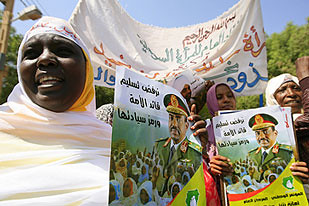
Women demonstrate in support of the Sudan government. The central African state, the continent's largest, has become one of the emerging oil-producing countries., a photo by Pan-African News Wire File Photos on Flickr.
Sudan agrees to allow aid in rebel-held border areas
Sat Jun 30, 2012 9:07am EDT
ADDIS ABABA/KHARTOUM (Reuters) - Sudan has agreed to allow humanitarian aid to civilians in rebel-controlled areas of two war-torn border states where aid groups have warned of an impending famine, the African Union and Sudanese state media said on Saturday.
Fighting in South Kordofan and Blue Nile has forced hundreds of thousands of people to flee their homes since last year, the United Nations and aid groups say.
The clashes broke out between government forces and rebels of the Sudan People's Liberation Movement North (SPLM-N) around the time South Sudan declared independence last year.
Aid groups and the United States and have said the fighting has reduced the usual harvests in the two states, which could face massive food shortages as stocks dwindle.
The African Union, United Nations and the Arab League proposed a plan earlier this year to secure the delivery of aid to both states, but Sudan had rejected the proposal, saying it had the humanitarian situation under control.
On Saturday, the state-linked Sudanese Media Centre reported the government had accepted the proposal in order to "relieve the distressed conditions in which citizens live in the areas under SPLM-N control".
The African Union welcomed the deal in a statement and said it was willing to contribute monitors and other personnel and urged "all those responsible to ensure that it is effectively and fully implemented without further delay".
The conflict in the two states is rooted in decades of north-south civil war in Sudan. The civil war ended with a 2005 peace deal that paved the way for South Sudan to declare independence last July.
But partition left tens of thousands of fighters who had battled against Khartoum north of the border.
The rebels in South Kordofan and Blue Nile say they are fighting to overthrow Sudanese President Omar Hassan al-Bashir and end what they see as the marginalization of minority groups.
Khartoum accuses the rebels of trying to sow chaos on behalf of their former comrades in Juba - an allegation South Sudan denies, but which has hindered talks between the two countries on unresolved issues related to the partition.
Malik Agar, head of the rebel umbrella Sudan Revolutionary Front (SRF) which includes the insurgents in Blue Nile and South Kordofan, told Reuters this month dozens of people were dying each day due to lack of food and medicine.
Sudan's acceptance comes two days after it adjourned peace talks with South Sudan until July 5.
(Reporting by Aaron Maasho and Alexander Dziadosz; Editing by Alison Williams)
No comments:
Post a Comment